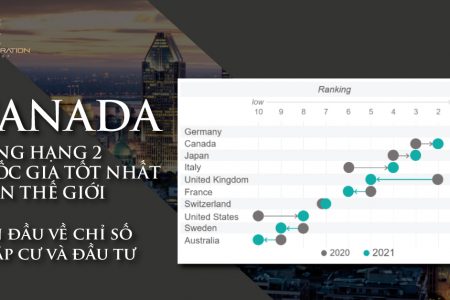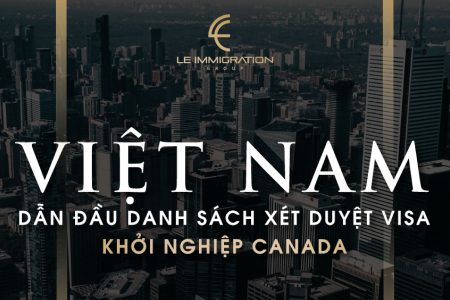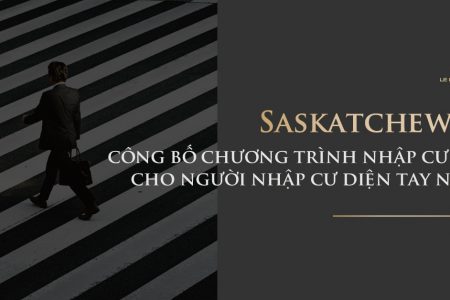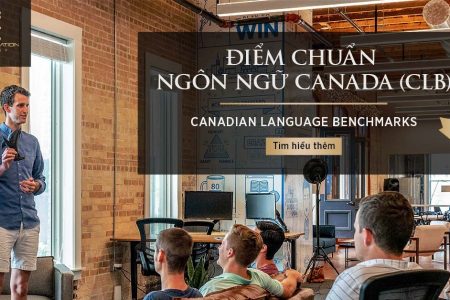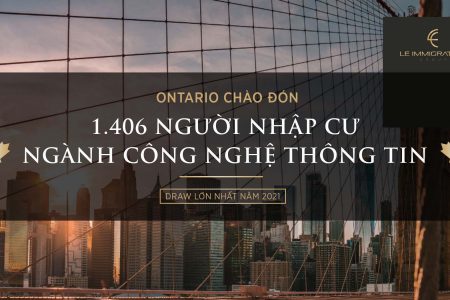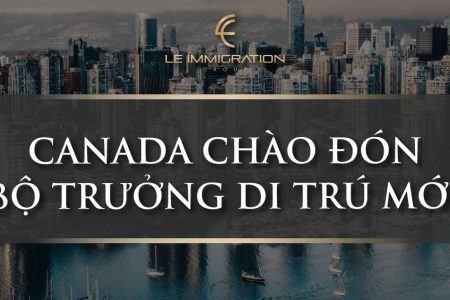The border is open and many new permanent residents are about to make their way to the country of maple leaves. Here is Le Immigration’s list of priority things to do in the first two weeks when you arrive in Canada!
Canada has completely opened its border from September 2021 because the disease has been well controlled in many parts of the world and in Canada itself. This is an ideal time for those who have a confirmation of permanent residence (COPR) to settle a new life in the country of maple leaves.
However, adapting to your new life can take a long time if you don’t have the right information and don’t know what to do. Knowing that, Le Immigration would like to share the important things to do within the first two weeks of entering Canada. This will help you dispel your worries and start a new life smoothly.
Let’s check out Le Immigration’s list of priority things to do in the first two weeks:
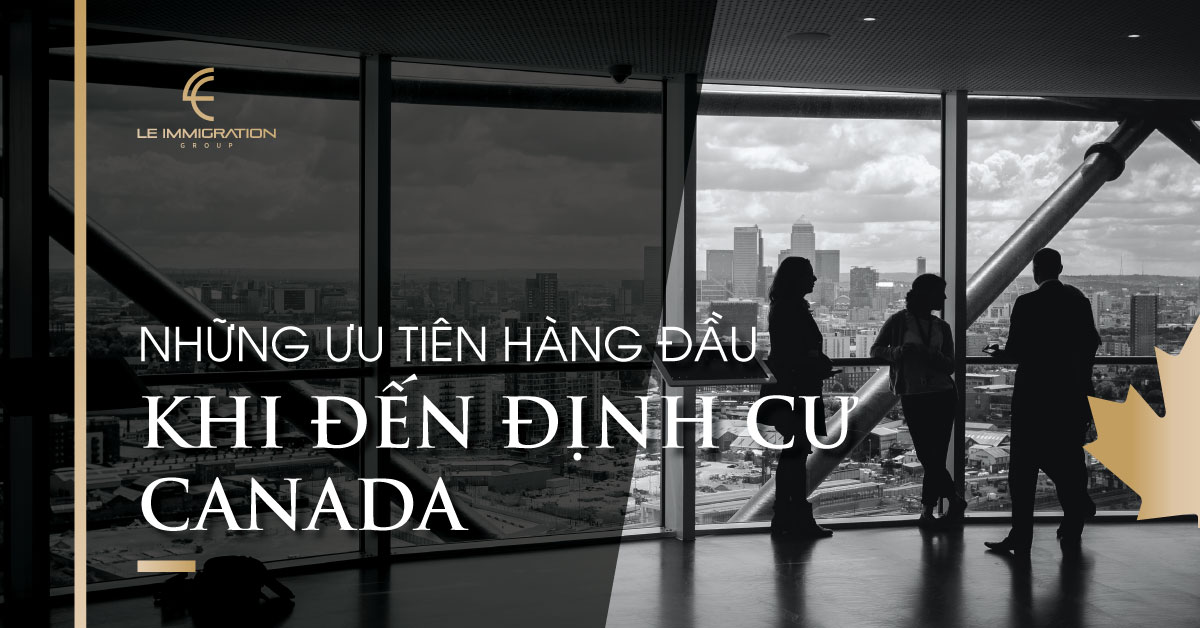
Finding housing early
One of the clients’ top priorities after arriving in Canada is to find a temporary place to live until they do their due diligence to rent or buy a permanent home. If you do not have relatives in Canada, you should choose to stay at a hotel or an Airbnb apartment for a short term. (To save time and money, you can consider places near the Subway or near bus stops).
To find a home or information about the real estate in your neighborhood, you can visit a number of websites provided by the government or reputable organizations. In particular, this “Find free newcomer services near you” (https://www.cic.gc.ca/english/newcomers/services/index.asp) is a link that provides a lot of news and useful information relating to the purchase, rental or maintenance of housing. You can contact service providers in the province you live in for maximum support.
In addition, rental information can be easily found in local newspapers and real estate offices in your area. However, the best way is to ask an immigration service company for assistance, or rent a house with a Vietnamese owner. You should also visit the house before deciding to rent and carefully read the lease contract, to understand the costs as well as the regulations on receiving and returning the house.
Register a phone number and download some popular apps
To serve the needs of communication, surfing the web, searching for information, … when you first set foot in Canada, the first thing to do is buying a phone sim. In Canada, there are many carriers to choose from such as Telus, Virgin, Roger, Bell, Koodo, etc. Depending on each person’s situation, you can choose a suitable package for yourself. Find out all the carriers to see which package is more suitable for you. People can easily find network carriers, register phone sims at major Shopping Malls near your area.
After having a sim phone, you can download a number of utility applications for eating, shopping, moving, .. in Canada, some popular applications in Canada include:
- Transit: the app that makes your travel in Canada more convenient and easier.
- Uber Canada: is commonly used in many cities in Canada, and gives you a “cheaper” price than traditional taxis in Canada.
- Uber Eats: Uber’s food delivery ordering app.
- Flipp: the app that can save you up to 50% on your weekly shopping by bringing you the latest weekly coupons and deals from top retailers in Canada like Walmart, Canadian Tire, No Frills, Sobeys.
- Instacart: shopping app
- Amazon: online shopping app.
- Indeed: the application offers millions of job information from companies in Canada and allows job search by many criteria.
Get important immigration documents
As soon as you arrive, you need to collect important documents, including:
- Work permit: If your immigration is under Provincial Skilled Worker program, or Federal Start-Up, you will not receive a Permanent Resident Card, but will receive a Work Permit (WP). WP will be issued upon arrival in Canada, you need to check to make sure your information matches, including personal information, working address, employer (under skilled immigration), duration, etc… WP is also valid as an “identity” card while living and working in Canada.
- Permanent Resident Card (PR): For those who are granted permanent residency before coming to Canada, the Card will be issued after the entry, and sent to the registered address. This is the first and most important document to travel, open a bank account, and complete other required procedures with the authorities.
Immigration under Start-Up Program
- See more: Settlement and start-up Start-up Visa
Immigration under Skilled Worker Program
- See also: Ontario Provincial Nominee Program – OINP
- See also: Saskatchewan Provincial Nominee Program – SINP
- See also: 4 Atlantic Provincial Nominee Program – AIPP
- See also: Skilled Immigration Program – Express Entry
The Social Insurance Number (SIN) is a 9-digit number provided by the Service Canada Centre from the federal government.
This is also one of the first things to do when you arrive in Canada. Only with a Social Insurance Number can you legally work in Canada, or apply for government programs to receive social benefits. As you arrive in Canada, you need to apply for a SIN as soon as possible.
Currently, it is only possible to apply for a SIN card online or by post. Use your PR card to get your SIN on arrival. The SIN is needed to pay taxes, apply for investments, open a savings account, and find a job. Your Social Security-related information should be carefully protected.
Register for Health Insurance
When first arriving in Canada, immigrants need to apply for a health insurance card from the provincial or local government as soon as possible. Applications for a health insurance card are available at a clinic, hospital, pharmacy, or immigrant-serving organization. Immigrants can also download the form on the website of the provincial or local government agency responsible for health and wellness. You can learn more about Canadian health cards (conditions, services provided,…) at this link: https://www.canada.ca/en/health-canada/services/health-cards.html
Note that if you register to live in a province, you will receive health insurance in that province. Many provinces offer immediate access to health insurance, but some provinces and territories require a three-month waiting period. If you live in one of the following locations, you will need to purchase temporary private insurance for the time being: British Columbia, Ontario, Quebec, Saskatchewan, Northwest Territories, New Brunswick, Yukon, etc.
In Canada, you have access to free health insurance for most basic medical services (exams and treatment by a GP, hospital care, testing and some other services). Except for some dental and eye exams, prescription glasses, and home care. You can purchase additional private health insurance for these services, which is also sometimes offered by employers when you work for them. You will need to show your health insurance card to receive care at local medical facilities.
Open a Bank account and apply for Credit
In fact, you should do it before arriving in Canada, so that the money is already in the account. Most banks have an account opening service on their website through an online application. You only need to provide your passport number when checking in, then you will have a detailed account number after it is approved.
As soon as you arrive in Canada, you go to the bank and give them your passport for banking transactions. The consultant not only assists in opening a bank card, but can also provide some basic financial understanding, of how quickly to build a credit history or the conditions of a car loan or home mortgage. Many banks have a “Budget Calculator” tool to help you estimate the necessary expenses. This will contribute to better management of spending when the cost of living, the price of goods, etc. are different from Vietnam.
If possible, you should get a credit card as soon as possible to start building your new credit history. In Canada, landlords, utility companies, banks, credit unions, and even employers look at credit history and scores to determine if a client or candidate is financially stable and trustworthy.
Here are some big-name banks for newcomers to Canada:
- CanadaNational Bank of Canada (national bank of Canada)
- CIBC (Canadian Imperial Bank of Commerce)
- TD Canada Trust
- HSBC Canada
- Scotiabank
- Bank of Montreal (BMO)
- Royal Bank of Canada
Converting driver’s license in Canada
If you have a valid driver’s license from Vietnam (or whatever country you live in), you will be able to use it to drive in Canada for a short time after you arrive. A Vietnamese driver’s license can be used in Canada with the following conditions:
- Convert Vietnamese Driver’s Licence to Canada (IDP International Driver’s Licence)
- When driving in Canada, always carry your original driver’s license with you (in case the police ask for it).
In fact, as long as you change your Vietnamese driver’s license to Canada, you can rent and drive a car in Canada. However, many of you should still carry your original driver’s license with you in case someone asks for it.
This license will allow you to drive anywhere in the country. Applying for a replacement driver’s license should be done as soon as possible as the process can take a certain amount of time depending on which province you are living.
Note: You should change your Vietnamese driver’s license to international driver’s license with a validity of 3 years. In 3 years, you will have time to study and take the test for a Canadian driver’s license.
Register school for you kids
Education is compulsory in Canada from grades 1 to 12. Public schools must admit students of this age to live in their area and it’s free. However, each province will have 1 or more Departments of Education managing public schools, and will place your kids in appropriate schools. You need to register with your local Department of Education in order for your child to attend school.
You can also choose to send your child to a private school, but you will have to contact the school directly to get admission. Good private schools in Canada, especially high schools (grades 9-12) have fairly high tuition and enrollment standards, even for locals. Therefore, you should research carefully before making a decision.
Apply for tax benefits
Canada has federal and provincial subsidies and tax credits designed to assist families and individuals with modest or low incomes. Consists of:
- GST Support: As a new resident of Canada, you can apply for GST (Goods and Services Tax) / HST (Harmonized Sales Tax) assistance. GST is a sales tax charged on most goods and services sold in Canada. In many provinces, GST has been “Harmonized” with the provincial sales tax, becoming the Harmonized Sales Tax, or HST. The GST/HST Credit is a tax-free quarterly payment that helps low-income individuals and families offset all or part of the GST or HST they incur in their daily lives.
- Child Benefit: is a financial aid for families raising children under the age of 18 who meet the eligibility requirements for residency status. Once granted Canadian permanent resident status, your children can receive this support immediately. If you are a temporary resident on a work permit, your children can enjoy this benefit from the 19th month of their stay in Canada. The amount received depends on the number of children and their ages, as well as the family’s income.
In addition, benefits for children, the unemployed, and the elderly are also enhanced by the Federal and provincial governments to promote a comprehensive welfare policy in Canada. You can take the time to learn about these benefits to apply for and receive benefits after meeting required time to live and work in Canada.
“To live and work in peace and contentment” in Canada
Free from anxiety when moving to Canada, with Le Immigration
Three criteria make the success of immigration consulting services:
- Accurately assess customer needs
- Guaranteed success rate and quick approval
- Offer an effective settlement solutions when moving to Canada
And that is also the goal Le Immigration always aims to support customers on the journey to acquire Canadian permanent residence. Not only providing professional immigration consulting services, we are also committed to working with you on finding solutions to “settle down”, and to help our clients get on well with the Canadian life and labor market soonest.
EASILY SETTLE DOWN:
- Support to find a house and free rent for the first 6 months upon arrival
- Support to acquire social security book
- Support opening a bank account
- Support to find a school for your child
CAREER FINDER:
- Consulting and training on foreign language skills.
- Consulting on setting up and operating a business in Canada.
- Job counselling for accompanying people
- Relative sponsorship consulting
- Real estate investment consulting
Working with Le Immigration, clients will have the opportunity to receive direct advice from an Expert who has more than 21 years of experience in Immigration consulting, and is a member of the ICCRC Association of Consultants appointed by the Canadian government. Your profile will be processed with safety, accuracy and highest success rate.
Source: General (From online articles and information from the Government of Canada Website)
If you have any questions about Canada immigration documents and procedures, please feel free to contact us:
The Immigration Group
Address: Tầng 17, TNG Tower, 180-192 Nguyễn Công Trứ, P. Nguyễn Thái Bình, Quận 1, TP. Hồ Chí Minh.
Phone number: 0936-168-599.
Website: https://minhle.ca/
Le Immigration Group is pleased to accompany you on the path to realizing your dream of living in Canada.


